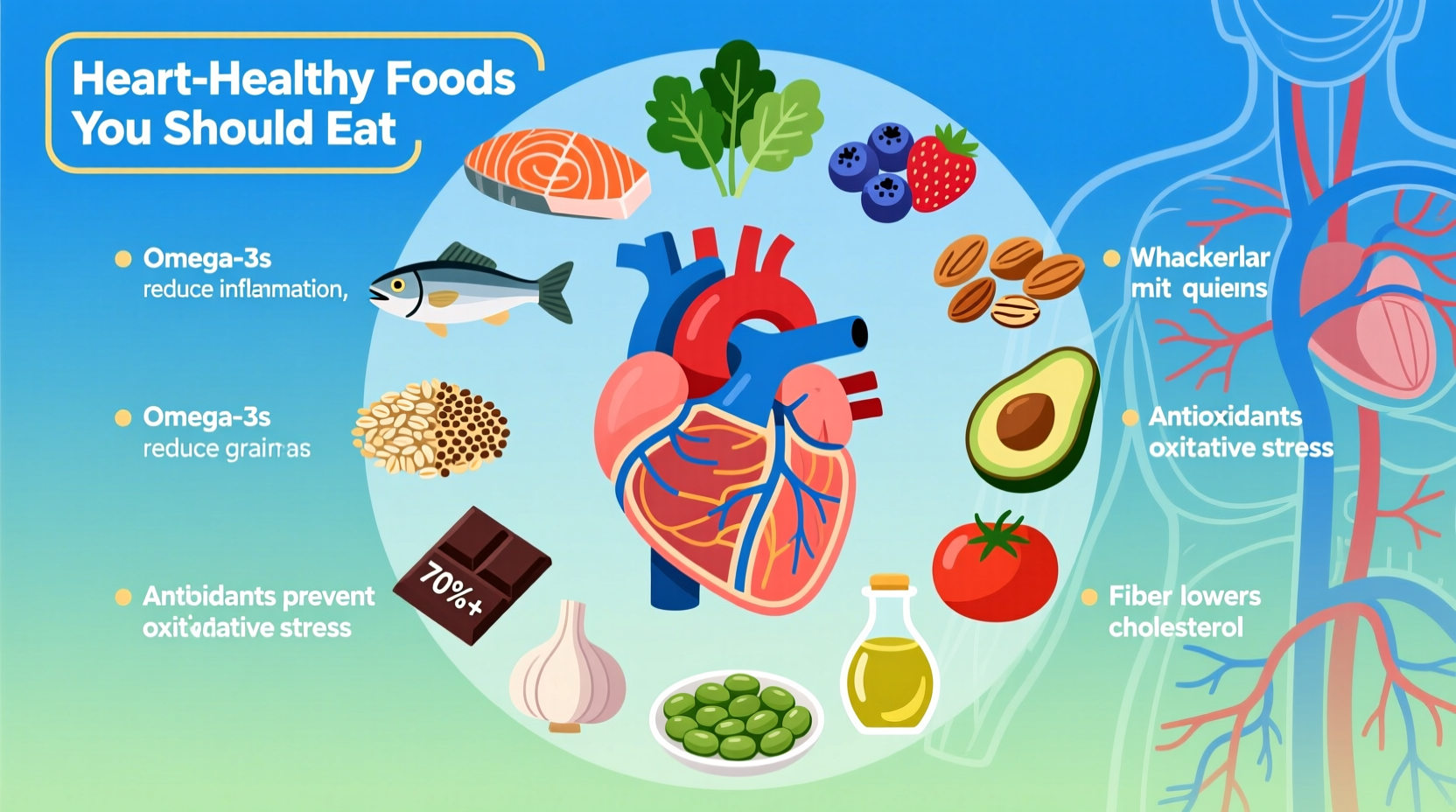Heart disease remains the leading cause of death globally, but research shows that dietary choices significantly influence your cardiovascular risk. By understanding which foods deliver proven heart benefits, you can make strategic changes to protect your most vital organ. This guide cuts through conflicting nutrition advice to deliver evidence-based recommendations you can trust and implement immediately.
Why Heart-Healthy Eating Matters Now
According to the Centers for Disease Control and Prevention, nearly half of all American adults have at least one major risk factor for heart disease. The good news? A comprehensive analysis published in Circulation demonstrated that dietary improvements could prevent approximately 80% of coronary artery disease cases. Unlike fad diets that come and go, the foods highlighted in this guide have stood the test of rigorous scientific evaluation.
Your Heart-Healthy Food Framework
Instead of overwhelming you with endless lists, we've prioritized foods with the strongest evidence base. These categories form the foundation of cardioprotective eating patterns like the Mediterranean diet, which the American Heart Association recommends for optimal heart health.
Fatty Fish: Nature's Omega-3 Powerhouse
Fatty fish like salmon, mackerel, and sardines deliver EPA and DHA omega-3 fatty acids that reduce inflammation, lower triglycerides, and decrease arrhythmia risk. The American Heart Association recommends consuming fatty fish at least twice weekly. A 12-year study tracking 20,000 physicians found those eating one serving of fish weekly had a 15% lower risk of heart disease compared to those who rarely ate fish.
Leafy Green Vegetables: Vitamin K Champions
Kale, spinach, and Swiss chard provide substantial vitamin K, which protects arteries and prevents calcium buildup. These greens also deliver nitrates that improve blood vessel function. Research from the University of Sydney showed that consuming just 1.5 cups of leafy greens daily reduced the risk of heart disease by 16%.
Berries: Antioxidant Superstars
Blueberries, strawberries, and blackberries contain anthocyanins that reduce oxidative stress and inflammation. A Harvard study following 93,600 women found those eating three or more servings of berries weekly had a 32% lower risk of heart attack. The antioxidants in berries improve HDL ("good") cholesterol function and reduce blood pressure.

Scientific Evidence at a Glance
| Food Category | Key Heart Benefits | Recommended Intake | Primary Research Source |
|---|---|---|---|
| Fatty Fish | Reduces triglycerides, lowers inflammation | 2 servings/week (6-8oz each) | American Heart Association 2023 Scientific Statement |
| Leafy Greens | Improves arterial function, reduces calcification | 1.5 cups daily | Nutrition Journal 2022 Meta-Analysis |
| Berries | Enhances HDL function, lowers blood pressure | 3+ servings/week | Journal of the American Heart Association 2021 |
| Nuts | Improves cholesterol profile, reduces inflammation | 1 handful (1.5oz) daily | New England Journal of Medicine 2020 Study |
Evolution of Heart-Healthy Dietary Recommendations
Understanding how dietary guidance has evolved helps separate enduring principles from passing trends. The timeline below shows key developments in heart-healthy eating science:
- 1950s-1970s: Focus primarily on reducing total fat intake, particularly saturated fats
- 1980s-1990s: Low-fat craze emerges, often replacing fats with refined carbohydrates
- 2000s: Recognition that not all fats are equal; emphasis shifts to fat quality over quantity
- 2010s: Mediterranean diet gains prominence through landmark PREDIMED study
- 2020s: Personalized nutrition approaches emerge, recognizing individual variations in response to foods
The PREDIMED study, published in the New England Journal of Medicine, followed 7,447 high-risk individuals for nearly five years. Those following a Mediterranean diet supplemented with extra-virgin olive oil or nuts had a 30% lower risk of major cardiovascular events compared to those on a low-fat diet. This research fundamentally shifted dietary recommendations away from strict fat restriction toward emphasizing healthy fat sources.
Practical Implementation Guide
Knowing which foods help your heart is only valuable if you can incorporate them into your daily routine. These actionable strategies make heart-healthy eating sustainable:
Simple Swaps for Maximum Impact
- Replace butter with avocado or olive oil in cooking and baking
- Choose whole grain versions of your favorite carbohydrates (brown rice instead of white, whole wheat pasta)
- Snack on a small handful of raw nuts instead of processed crackers
- Add berries to your morning oatmeal or yogurt
- Substitute red meat with fatty fish two nights per week
Sample Heart-Healthy Day
- Breakfast: Oatmeal topped with blueberries, walnuts, and chia seeds
- Lunch: Large spinach salad with grilled salmon, avocado, olive oil dressing, and whole grain roll
- Snack: Handful of almonds and an orange
- Dinner: Mackerel with roasted Brussels sprouts and quinoa
Important Considerations for Your Heart Health Journey
While diet plays a crucial role in heart health, several contextual factors influence how these recommendations apply to you:
- Individual Variability: Genetic factors affect how people metabolize certain nutrients. Some individuals may need to monitor saturated fat intake more carefully than others.
- Medical Conditions: Those with kidney disease may need to modify potassium-rich food intake. Always consult your healthcare provider before making significant dietary changes if you have existing health conditions.
- Medication Interactions: Vitamin K-rich greens can interact with blood thinners like warfarin. If taking such medications, maintain consistent vitamin K intake rather than eliminating these healthy foods.
- Comprehensive Approach: Diet alone cannot compensate for other risk factors like smoking, physical inactivity, or uncontrolled hypertension.
Building Sustainable Heart-Healthy Habits
Research shows that gradual, consistent changes yield better long-term results than drastic overhauls. Start with one or two manageable adjustments, like adding a serving of fatty fish weekly or replacing your cooking oil with extra-virgin olive oil. Track your progress using a simple food journal for two weeks to identify patterns and celebrate small victories. Remember that perfection isn't the goal—consistent progress toward heart-healthy patterns delivers the greatest benefits over time.
Frequently Asked Questions
How quickly can dietary changes improve heart health?
Research shows measurable improvements in blood pressure and cholesterol levels within 4-12 weeks of consistent dietary changes. The PREDIMED study demonstrated reduced cardiovascular events after just one year of following a Mediterranean diet pattern.
Are supplements as effective as whole foods for heart health?
Whole foods generally provide superior benefits compared to supplements. The synergy of nutrients in whole foods creates effects that isolated supplements cannot replicate. For example, while fish oil supplements can lower triglycerides, they don't provide the same comprehensive cardiovascular protection as eating whole fatty fish.
Can I still enjoy coffee if I'm focusing on heart health?
Yes, moderate coffee consumption (3-5 cups daily) appears neutral or potentially beneficial for heart health according to research published in the Journal of the American College of Cardiology. However, avoid adding excessive sugar or high-fat creamers that negate potential benefits.
How much sodium is acceptable for heart health?
The American Heart Association recommends no more than 1,500 mg of sodium daily for optimal heart health, though the current dietary guideline is 2,300 mg. Most Americans consume over 3,400 mg daily, primarily from processed foods rather than table salt.
Do organic foods provide additional heart benefits?
Current research doesn't show significant differences in heart health benefits between organic and conventionally grown produce. The most important factor is consuming adequate amounts of fruits, vegetables, and whole grains regardless of farming method.











 浙公网安备
33010002000092号
浙公网安备
33010002000092号 浙B2-20120091-4
浙B2-20120091-4